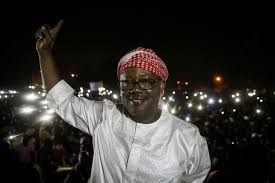Umaro Sissoco Embaló, the youngest president Guinea-Bissau has ever had, embodies “change” for his supporters, but faces the daunting task of leading a country known for its unruly political history.
Embaló, 47, was voted in as president of Guinea-Bissau under the banner of the Movement for Democratic Change (Madem G15) and officially proclaimed winner of the election run-off on January 1, 2020.
A former Prime Minister (2016-2018) during the presidency of José Mário Vaz, he won 53.55 percent of the votes, as against 46.45 percent for Domingos Simoes Pereira, the candidate of the African Party for the Independence of Guinea and Cape Verde (PAIGC), the dominant political force in this former Portuguese colony, which became independent in 1974 after a long battle for national liberation.
A reserve Brigadier General, Umaro Embaló specialized in defense and geostrategic issues. Close to several African leaders, he has a vast network of relations on the continent. A former close friend of the late Libyan leader, Muammar Gaddafi, he has previously served as Representative of the Libyan Investment Fund in West Africa.
The newly elected president is a dissident from PAIGC. His political party, Madem G15, was created just a year and a half ago. Umaro Sissoco Embaló speaks Portuguese and French; he will nevertheless have to coexist with his former comrades of the PAIGC, who have the majority in the National Assembly.
The Constitution of Guinea-Bissau provides that the parliament appoints the Prime Minister. But this choice is likely to be revoked by the President of the Republic. With 27 seats, Madem is the second parliamentary political force.
Guinea-Bissau, which has 1.8 million inhabitants, had since independence in 1974 experienced several cycles of violence.
The military, which had been very much involved in the political life of the country, had carried out several coups in the country’s history, the last of which dates back to 2012, leaving the country in a state of permanent instability.
To reassure the country’s public opinion, General Biague Na Ntam, the Army Chief, had said on the eve of this presidential election that the soldiers would stay in their barracks.
According to the final results of the election, Umaro Embaló, a father of three, came first in seven of the 10 regions of Guinea-Bissau.
NM/id/te/fss/GIK/APA


